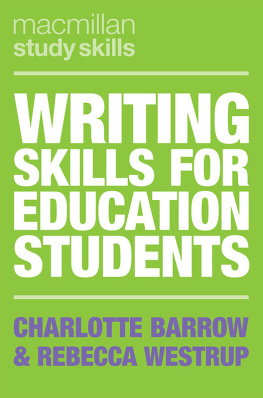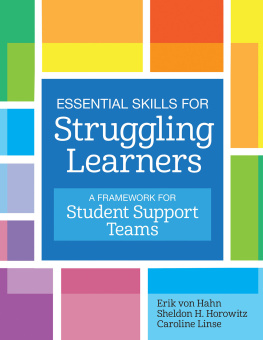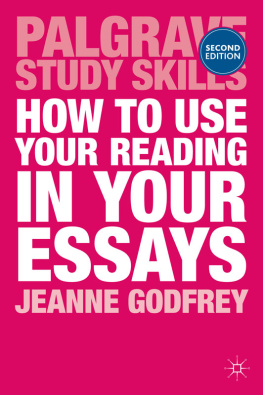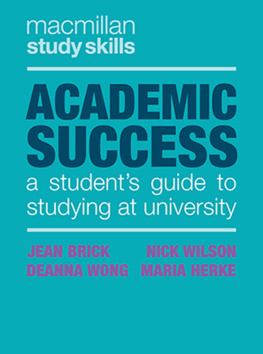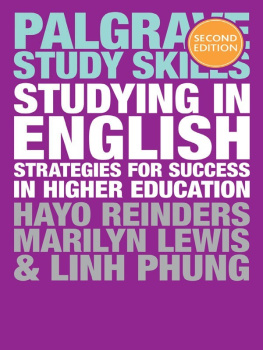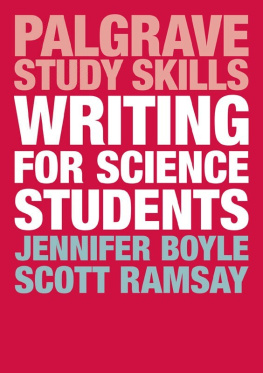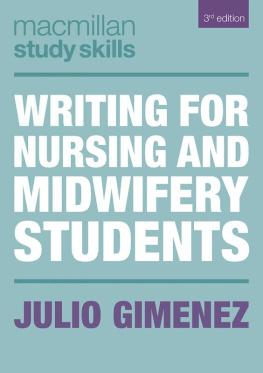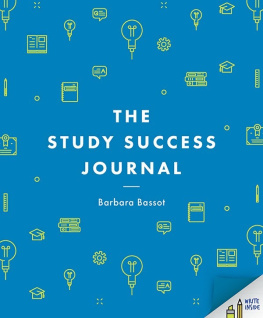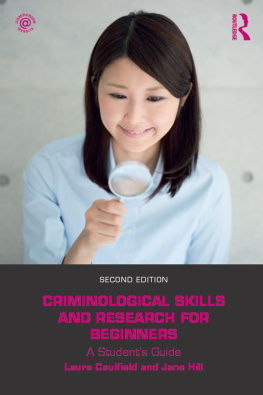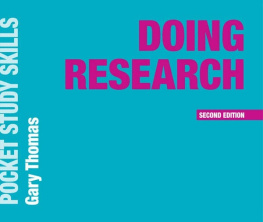Writing Skills for Education Students
www.thestudyspace.com the leading study skills website
Study Skills
Academic Success
Academic Writing Skills for International Students
The Business Students Phrase Book
Cite Them Right (10th edn)
Critical Thinking and Persuasive Writing for Postgraduates
Critical Thinking Skills (3rd edn)
Dissertations and Project Reports
The Employability Journal
Essentials of Essay Writing
The Exam Skills Handbook (2nd edn)
Get Sorted
Great Ways to Learn Anatomy and Physiology (2nd edn)
How to Begin Studying English Literature (4th edn)
How to Use Your Reading in Your Essays (3rd edn)
How to Write Better Essays (4th edn)
How to Write Your Undergraduate Dissertation (2nd edn)
Improve Your Grammar (2nd edn)
The Mature Students Handbook
Mindfulness for Students
The Macmillan Student Planner
The Personal Tutors Handbook
Presentation Skills for Students (3rd edn)
The Principles of Writing in Psychology
Professional Writing (3rd edn)
Skills for Success (3rd edn)
Stand Out from the Crowd
The Student Phrase Book
The Students Guide to Writing (3rd edn)
Study Skills Connected
The Study Skills Handbook (4th edn)
Study Skills for International Postgraduates
Studying in English
Studying History (4th edn)
Studying Law (4th edn)
Studying Physics
Success in Academic Writing (2nd edn)
Smart Thinking
The Undergraduate Research Handbook (2nd edn)
The Work-Based Learning Student Handbook (2nd edn)
Writing for Engineers (4th edn)
Writing History Essays (2nd edn)
Writing for Law
Writing for Nursing and Midwifery Students (3rd edn)
Write it Right (2nd edn)
Writing for Science Students
Writing Skills for Education Students
You2Uni: Decide. Prepare. Apply.
Pocket Study Skills
14 Days to Exam Success (2nd edn)
Analyzing a Case Study
Blogs, Wikis, Podcasts and More
Brilliant Writing Tips for Students
Completing Your PhD
Doing Research (2nd edn)
Getting Critical (2nd edn)
Managing Stress
Planning Your Dissertation (2nd edn)
Planning Your Essay (2nd edn)
Planning Your PhD
Posters and Presentations
Reading and Making Notes (2nd edn)
Referencing and Understanding Plagiarism (2nd edn)
Reflective Writing
Report Writing (2nd edn)
Science Study Skills
Studying with Dyslexia (2nd edn)
Success in Groupwork
Time Management
Wheres Your Argument?
Writing for University (2nd edn)
Research Skills
Authoring a PhD
The Foundations of Research (3rd edn)
Getting to Grips with Doctoral Research
Getting Published
The Good Supervisor (2nd edn)
The Lean PhD
PhD by Published Work
The PhD Viva
The PhD Writing Handbook
Planning Your Postgraduate Research
The Postgraduate Research Handbook (2nd edn)
The Professional Doctorate
Structuring Your Research Thesis
Career Skills
Excel at Graduate Interviews
Graduate CVs and Covering Letters
Graduate Entrepreneurship
How to Succeed at Assessment Centres
Social Media for Your Student and Graduate Job Search
The Graduate Career Guidebook
Work Experience, Placements and Internships
For a complete listing of all our titles in this area please visit www.macmillanihe.com/study-skills
Writing Skills for Education Students
Charlotte Barrow and Rebecca Westrup

Charlotte Barrow and Rebecca Westrup, under exclusive licence to Springer Nature Limited 2019
All rights reserved. No reproduction, copy or transmission of this publication may be made without written permission.
No portion of this publication may be reproduced, copied or transmitted save with written permission or in accordance with the provisions of the Copyright, Designs and Patents Act 1988, or under the terms of any licence permitting limited copying issued by the Copyright Licensing Agency, Saffron House, 610 Kirby Street, London EC1N 8TS.
Any person who does any unauthorized act in relation to this publication may be liable to criminal prosecution and civil claims for damages.
The authors have asserted their rights to be identified as the authors of this work in accordance with the Copyright, Designs and Patents Act 1988.
First published 2019 by
RED GLOBE PRESS
Red Globe Press in the UK is an imprint of Springer Nature Limited, registered in England, company number 785998, of 4 Crinan Street, London N1 9XW.
Red Globe Press is a registered trademark in the United States, the United Kingdom, Europe and other countries.
ISBN 9781137610188 paperback
This book is printed on paper suitable for recycling and made from fully managed and sustained forest sources. Logging, pulping and manufacturing processes are expected to conform to the environmental regulations of the country of origin.
A catalogue record for this book is available from the British Library.
A catalog record for this book is available from the Library of Congress.
Contents
Introduction
This book is about how you can get the most out of your degree and develop and enhance your knowledge, understanding and skills required to be a successful Education student. Drawing on current students experiences of studying an undergraduate Education degree programme and our experiences as lecturers, we hope the information from us and tips from our students will help you to feel prepared and confident about your studies. In this short introduction we consider what it means to be a student of Education and set out the aims of the book before explaining its structure.
What does it mean to be a student of Education?
The study of Education is interdisciplinary and draws on a number of subjects including Sociology, Psychology, History, Politics and Philosophy to develop our understanding and broaden our knowledge of how all ages learn, and the factors that can impact positively and negatively on this (Westrup, 2017). It also draws on wider aspects to critically explore the role of key facets such as society, the media and families. Education is a subject of importance to individuals, families, communities, governments and politicians, and society more broadly. The way in which we invest time and money in discussing and analysing the education system through debate and media coverage is indicative of the importance of education to the public interest.
Although throughout this book we refer primarily to Education students, note that this text is also relevant to those studying on programmes in similar disciplines such as Childhood Studies, Early Years, Education and Social Care, or as an introductory text for students undertaking a Masters in Education if prior undergraduate study has been in a different discipline learning to write in another academic field can make further study and professional development challenging, and so this book will support students in that position too.
So, what does it mean to be a student of Education? Youll find some more discussion around this in Chapter 5, but initially, it is useful for you to recognise that being a student of Education means that you are developing:
Your curiosity and enquiry around the process of teaching and learning, and not just that which happens in the classroom.
An interest in the educational experiences of learners from a wide variety of backgrounds, recognising that different opportunities and circumstances make educational successes and trajectories hugely variable.
Next page
